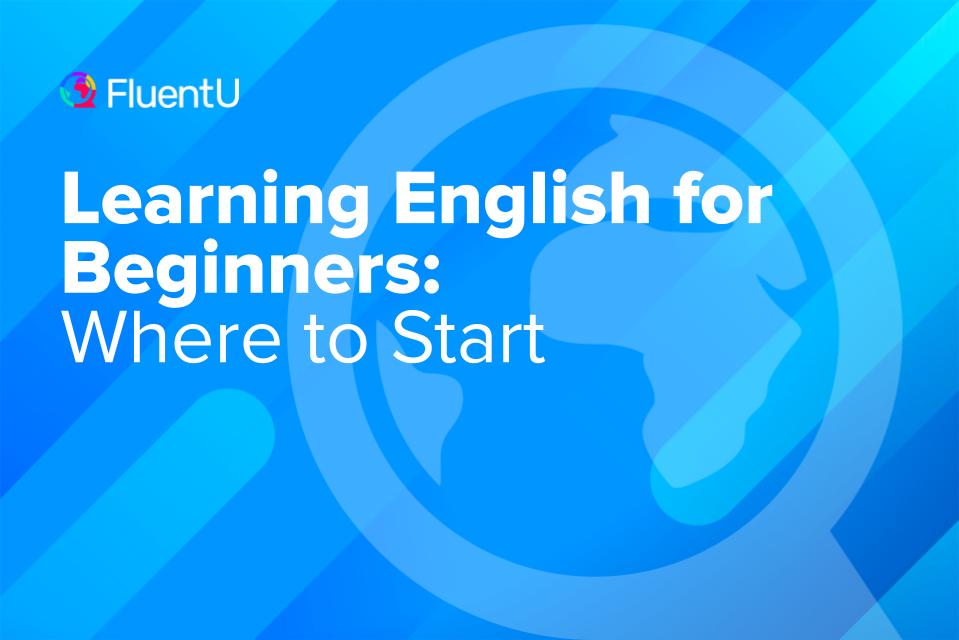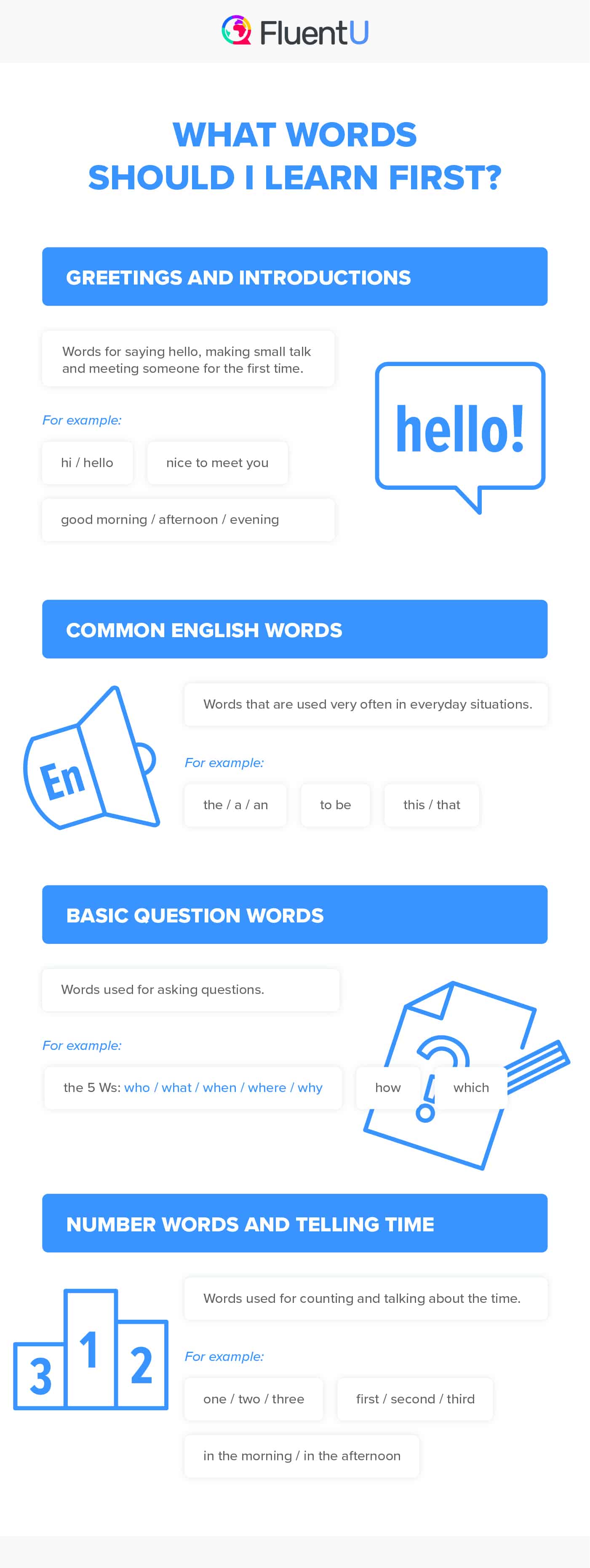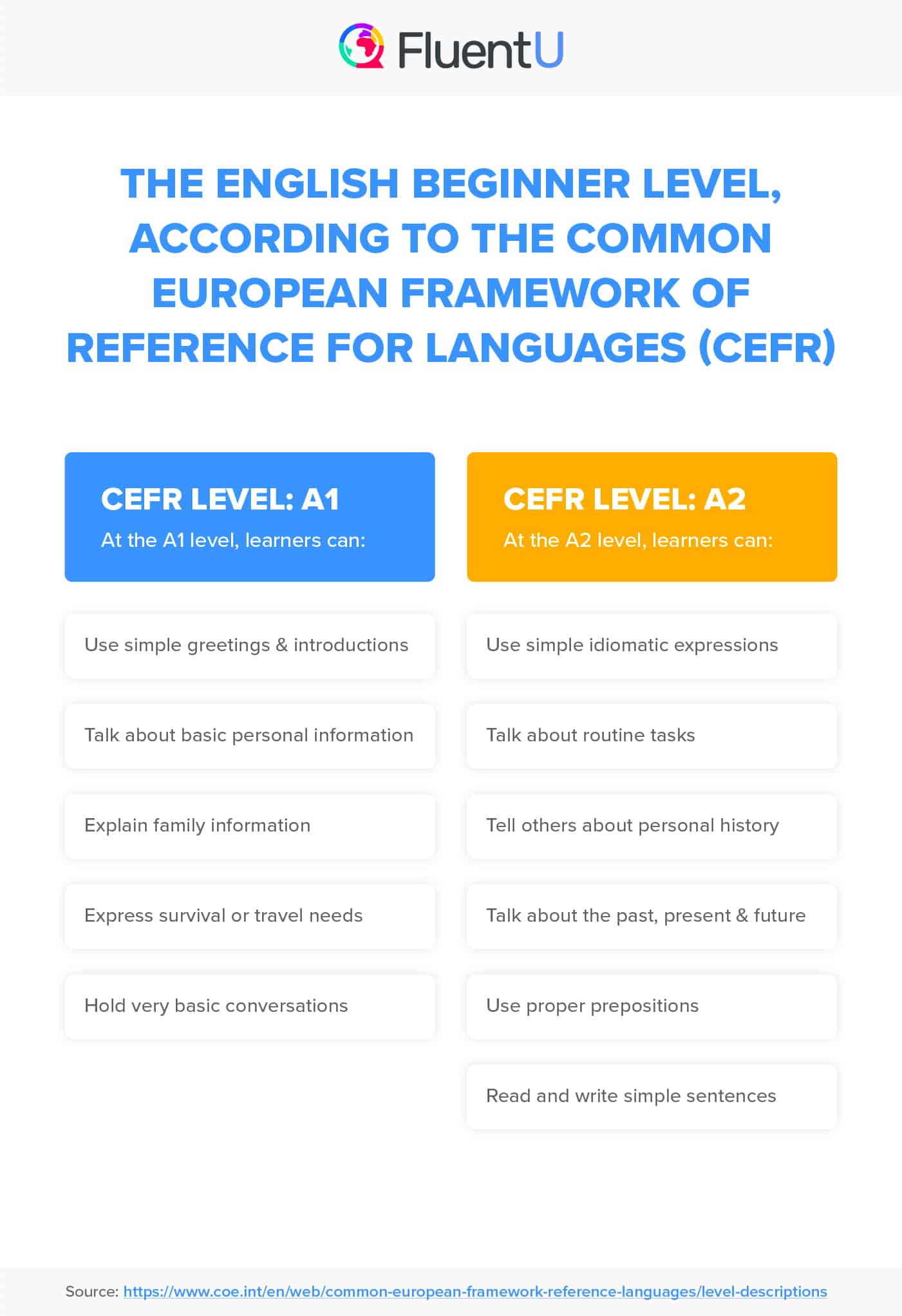Learning English for Beginners: Where to Start

Learning English almost means becoming a baby all over again. It means learning new sounds (maybe even a whole new alphabet), learning new words for things you have known your whole life and learning to count all over again.
In this post, I will take you through what being an English beginner means, how to start learning the language and tips you can use.
Download: This blog post is available as a convenient and portable PDF that you can take anywhere. Click here to get a copy. (Download)
How to Start Learning English
How you learn English as a beginner will depend on many factors. Your motivation (the reason you want to study English), goals (what you want to achieve or accomplish by studying English) and resources (something you can use to benefit you) will help you figure out what and how to study.
Know Your Motivation
Are you learning for travel? For work? For family or personal reasons?
Set Your Goals
Make your goals as specific (full of detail) as you can.
Your goals will depend on a few factors:
- What you want to learn
- How much time you have to study
- When you want to meet your goal
- How you can test what you have learned
Let us say you are traveling overseas (to a different country) to the United States in six months. You are going to visit your relatives (family members), who are planning a party in your honor. At the party, you will meet American friends and acquaintances (people you know who are not your friends or family).
You decide that you want to learn conversational English. You want to speak easily with everyone you meet at the party.
So, you know your time frame (amount of time) and what you want to learn. Therefore, your goal is to learn basic American English conversation in six months.
Since you work full time, you only have an hour a day to study.
You can test your learning by speaking English with an American tutor who is also fluent in your native language.
Find Your Resources
Find resources that work with your life. Think about your learning goals and how much time you have to study each day.
For example, if you want to focus on conversational English, you might not worry about learning a lot of written English.
Or, if you do not have much time to study, you can look for short exercises that can be done in a few minutes. That way, you can work on your English whenever you have a little free time.
No matter your goals, you want to use a variety of resources.
If you are trying to learn English for a job, get a foundation from a good course or textbook. Pair it with recorded dialogues you can use to improve your accent. Try mobile apps to learn more vocabulary and grammar. Take some easy English lessons to help you get started with the support you need.
Start with greetings and the most basic vocabulary words—the kind you see in picture dictionaries for kids. Begin with easier words and get to know them well. This approach will build your confidence.
Once you have learned a few basics, add in authentic (real, non-learner) resources. These will help you learn to speak more like a native English speaker. Real-world resources might include simple books, magazines, TV shows and movies.
Create Your Study Plan
Use your study goals and resources to create a study plan .
Your study plan should include a schedule . A schedule will let you know what you will study each week and how long you should study each day.
By deciding ahead of time what you need to study, you are less likely to miss important material.
Here’s our step-by-step guide to creating an effective English study plan, check it out!
English Phrases and Words for Beginners
When you first start learning English, there are certain basic words you should master. These words will be used often by native speakers. Knowing them will help you progress more quickly to independent English.
Use the “Basic Words and Survival English” suggestions below as a guide. Find simple words that fit into these categories. Use them to make yourself a list of important words and phrases to learn in English.

The most basic English words you need to learn first can be broken down into a few main topics.
Greetings and Introductions
Start with common English greetings like “Hello” and “Goodbye.”
You also have to learn how to address your family and friends, as well as the people you work with.
After mastering how to address people, learn how to introduce yourself in English in formal and informal situations.
Once you get to know the people around you a little bit, you can have basic conversations with them. Use common conversation starters and master small talk or the ability to talk about common topics with anyone.
Common English Words
When you meet people and make small talk with them, you will need words like commonly used English verbs to keep your conversation lively (full of energy).
Basic Question Words
Learning to ask questions in English is important for two reasons.
First, you need to ask questions to get information. Whether you are asking for directions, a place to stay or more information about a job, questions help you find out what you need to know.
Secondly, asking questions in English will improve your conversation skills. Most people like to talk about themselves. If you know how to ask questions, you can connect with people as you learn more about them.
Many questions in English start with the “five Ws”:
These “wh-” questions are essential when you are learning English as a beginner.
Number Words and Telling Time
Knowing how to count in English and how to read English numbers (especially large ones) will come in handy (be useful) every day—especially for addresses, phone numbers and shopping.
You also need to know numbers for learning how to tell time in English.
Once you have mastered numbers, common words, question words and all these other English fundamentals (basics), you can take your next steps to build on what you have learned, such as:
- Polite forms of address
- Weather words
- Days of the week, months and seasons
- Colors and shapes
- Household words
Use a language journal to keep track of the basic words and “survival English” you have learned. In your journal, practice writing out your new words and phrases. Try to make original sentences with them. Maybe you could write a short dialogue to recite aloud.
Practice your new words and phrases in conversation with English speakers. The more you practice saying these basic words, the more they will become part of your everyday speech. You will not even have to think about them after a while. You will use them automatically when they fit the situation.
English Grammar for Beginners
If English vocabulary words are the bricks that build your English-language “house” of knowledge, English grammar is the frame that gives the house structure.
Grammar may not be your favorite thing to study. But with a solid grasp (hold) of these English grammar essentials, you will find that it is a lot easier to speak, read, write and understand English:
- The English alphabet, English vowel sounds and English consonant sounds
- “To be” verbs
- Parts of speech (nouns, adjectives, pronouns, verbs, adverbs, etc.)
- English articles: the, a, an (definite, indefinite, possessive)
- Sentence structure and some basic easy English sentences
Once you have gotten the hang of (understood or mastered) these English grammar basics, your next steps will be to study topics such as prepositions, natural gender, verb tenses, gerunds and modal verbs.
With this solid foundation of English grammar knowledge, you will easily master simple English sentences and start to understand and use more complicated phrases.
English Skills for Beginners
Once you take time to learn essential words and phrases and understand how they work together with grammar, you will be ready to practice your English skills.
What are your English skills? They fit into four main categories:
- Listening
- Speaking
- Reading
- Writing
Listening and speaking go together. So do reading and writing. When you are able to do all of these simultaneously (at the same time), your road to fluency becomes easier.
Remember: before you can speak, you must listen. Before you can write, you must read.
Here is how you can master these four skills.
Listening and Speaking
Find resources that use very basic English, spoken slowly and clearly. Start with English conversations for beginners and short dialogues about simple topics like greetings. Pay attention to the words and phrases used to say hello, ask questions and say goodbye.
Listen first, then repeat.
Even if you cannot repeat perfectly at first, try your best to sound like the speakers in the dialogues. Take note of which words give you trouble and use strategies to learn proper English pronunciation.
But do not limit your English listening to dialogues. English media is plentiful—and the more varied (different) your listening, the more you will learn.
Use other techniques to get English listening practice for beginners from a variety of sources.
Listen and sing along with easy English songs. Repeating lyrics (words used in a song) will help you remember new words and phrases.
Watch kids’ TV shows like cartoons. They are a good excuse watch “Looney Toons,” “SpongeBob SquarePants,” “The Simpsons” or “Family Guy.”
Take time to learn some slang and English idioms. A lot of what you hear in television shows, songs and conversation will not be “textbook English.”
Using a language learning program can help you learn real-world English even faster, like for example FluentU.
FluentU takes authentic videos—like music videos, movie trailers, news and inspiring talks—and turns them into personalized language learning lessons.
You can try FluentU for free for 2 weeks. Check out the website or download the iOS app or Android app.
P.S. Click here to take advantage of our current sale! (Expires at the end of this month.)

Once you have spent some time watching or listening, start to practice simple conversation with a fluent English speaker or tutor. Ask them for feedback (comments to help you improve) on your English accent.
Ask each other questions to make sure you understand what you are hearing. Talk about English-language programs you have watched or English-language music you like.
Reading and Writing
Start with reading short, easy English reading resources. You want to understand most of what you read, even as you learn new words.
Easy short stories can be a great choice for beginning English readers too.
If you want to try reading longer texts, practice with English children’s books and other easy-to-read novels.
Do English reading practice for beginners and exercises that test your understanding, such as answering multiple-choice questions about what you read.
Once you have been reading in English for a while, you will feel more confident about writing. You will have a better idea of how to express yourself in written English.
Learn some English writing tips and practice them by writing short sentences and texts. Write about anything that interests you. You can write about your day-to-day life, the books you read or the TV shows you watch.
Try to find someone to read your texts—someone who knows English well and can give you tips to improve your writing.
How to Improve Your English
So, now you have everything you need to learn English. But how can you learn to avoid common mistakes? How can you go from learning the basics to speaking like a native?
Listen and Watch
Listen to English music, radio broadcasts and podcasts to help you learn. Radio stations around the world play English-language music. When you hear English songs on the radio, listen for words that you are learning.
You can also watch English-language TV, movies and videos. If you have a streaming service like Netflix, you probably have access to many English-language films and TV shows. YouTube is also a great place to find English-language videos on a topic you are interested in. Our channel, for example, offers language lessons based on popular movies, music and shows, such as “Friends”:
Imitate
Aside from listening to English-language music and shows, you can also try to imitate (copy or do something like) what you hear.
Listen to the words and how they are pronounced by native speakers. Try to make your tone of voice sound like theirs. In other words, you want to shadow them.
Of course, English has native speakers all over the world. If you really want to sound more like someone from a certain country, try to get most of your English-language audio and video from that country.
Swap Out Words
Learn practical phrases and words that go with them. Practice swapping out (changing) words in set phrases.
For example, when you learn to say, “Good morning,” you can try other greetings, like “Good afternoon,” “Good evening,” “Good night” or “Good day.”
In a dialogue about going to a restaurant, you might hear “May I have a glass of water?” Try to swap in other drinks. For example, try “May I have a glass of wine?” or “May I have a glass of tea?”
Learn Patterns
It is easier to remember patterns (things that repeat) than complicated rules.
For example, you might see patterns like this for most English verbs:
I/you/we/they see—but he/she/it sees.
I/you/we/they walk—but he/she/it walks.
I/you/we/they make—but he/she/it makes.
For the simple present tense of most English verbs, the pattern is that you add an -s for the third-person singular (he/she/it). The conjugations for I/you/we/they are identical to (the same as) each other.
So, instead of memorizing seven different conjugations for seven different persons, you only have to remember two conjugations.
Start Reading Shorter Texts
Start reading in English with something simple, like comics or children’s books. When you are learning English as a beginner, long news articles or 300-page novels will be too hard to understand. You might get frustrated and want to give up.
But when you start small, you will understand better and gain confidence—and want to learn more.
Take your time studying each text thoroughly (completely). As more words become familiar (known to you), you can read longer and more difficult texts.
Speak Often
Speak with native English speakers as often as you can. Find a language exchange partner or get an online tutor.
Try to have a short conversation in English with a native speaker at least once a week.
Challenge Yourself
Even if you start small, challenge yourself to use English wherever you can. Look at English-language websites. Join a group that uses English on social media. Go to a restaurant where English is spoken and order your food in English.
Keep a daily journal in English. Use your mobile phone to record yourself talking about your day in English. Practice consistently (doing something the same way over and over) and in different ways.
What is the English Beginner Level?
To make language learning more systematic, the Council of Europe created the Common European Framework of Reference for Languages or CEFR. This framework (supporting structure) is a useful way to know your language level as an English speaker.
There are a total of six CEFR levels. These match three kinds of learners:
- Basic User: Levels A1 and A2
- Independent User: Levels B1 and B2
- Proficient User: Levels C1 and C2
If you are learning English as a beginner, you will focus on CEFR levels A1 and A2.

CEFR Level: A1
Once you have studied English for a few weeks or months, you should be able to do these things that are considered A1 level according to the CEFR.
- Use simple greetings and introductions: You can say hello and introduce yourself to others.
- Talk about basic personal information: You can talk about yourself a little bit. You can describe your height, eye color, the length of your hair and other basics. You can also describe other people in general terms.
- Explain family information: You can talk about your family. You can describe your parents, discuss how many brothers or sisters you have and say if they are younger or older than you. You can say whether you are married or not and talk about how many children you have, and how old they are.
- Express survival or travel needs: At a restaurant or market, you can order meals or buy food. You can get a room in a hotel. You can also buy a plane or train ticket, or take a bus wherever you want to go. At the A1 level, you know enough English to make sure you have food, shelter (place to live) and transportation (what you use to travel or get around a place).
- Hold very basic conversations: As long as people speak English slowly, you can have simple conversations about basic topics. You feel confident talking about the weather. You can make comments about the world around you.
CEFR Level A2
When you get to the A2 level of the CEFR, you are no longer a complete beginner at English.
You can now understand and use harder words in English. You can talk about a wider range of topics and do the following.
- Use simple idiomatic expressions: At the A2 level, you’re starting to use simple English sayings and idioms. For example, you know it is time to study when someone tells you to hit the books . You ask others to pitch in when you need their time or ideas. You understand that a far cry means that one thing is really different from something else.
- Talk about routine tasks: Using simple words, you can talk about things you do often—like what you do at work or hobbies you enjoy in your spare (free) time.
- Tell others about personal history: You can tell people where you come from and where you have lived. You can describe your education and work history. You can also talk about your family in more detail than what I have mentioned earlier.
- Talk about the past, present and future: You know basic English verb tenses. You use verbs correctly when you speak about what happened last year, last week or yesterday. You can talk clearly about what is happening right now and what will happen tomorrow or next month.
- Use proper prepositions: Prepositions can be tricky (hard or difficult) for beginning English learners—but at the A2 level, you have a better understanding. You know how to use the proper prepositions when you talk. You know that you are responsible for yourself, that you put your coffee on the table and that you start work at nine o’clock in the morning.
- Read and write simple sentences: At the A2 level, you can read easy texts. You can understand short sentences in a simple story, such as a fairy tale or a children’s book. You can also write basic sentences, spell English words correctly and use the right verb tenses and prepositions. Your meaning in written English is clear.
Moving Up to Independent
Now you know all about English for beginners. How can you tell when you have reached the independent (B1/B2) level?
- Understand more complex idiomatic expressions: You know that break a leg means “good luck” and hit the hay means “go to sleep.” Now, you are learning that we’ll cross that bridge when we come to it means that “we’ll deal with that problem later.” You understand that the best thing since sliced bread means “something really good” and that on Cloud Nine means “very happy” (among other idiomatic expressions).
- Express opinions clearly: When someone asks what you think, you are able to tell them clearly. You can explain why you feel or believe the way you do. You can express your opinions in detail.
- Explain the reasoning behind basic decisions: If an English speaker asks you why you decided to do something, you can easily explain your reasoning.
- Understand basic texts fully: You can read simple articles or stories and understand them well. You can correctly answer questions about what you have read. In other words, you have good reading comprehension .
- Write about facts and opinions clearly: When you reach the independent English learner’s level, you can write about harder concepts. Your writing in English can state facts and express opinions in a clear and understandable way.
Consistency is the key to improving your English skills.
Practice a little bit every day. Practice listening and speaking, reading and writing. Review what you have learned and plan out what you would like to learn next.
Soon, you will be a master of English for beginners and move on to the next level!
And One More Thing...
If you like learning English through movies and online media, you should also check out FluentU. FluentU lets you learn English from popular talk shows, catchy music videos and funny commercials, as you can see here:
The FluentU app and website makes it really easy to watch English videos. There are captions that are interactive. That means you can tap on any word to see an image, definition, and useful examples.
For example, when you tap on the word "searching," you see this:
Learn all the vocabulary in any video with quizzes. Swipe left or right to see more examples for the word you’re learning.

FluentU helps you learn fast with useful questions and multiple examples. Learn more.
The best part? FluentU remembers the vocabulary that you’re learning. It gives you extra practice with difficult words—and reminds you when it’s time to review what you’ve learned. You have a truly personalized experience.
Start using the FluentU website on your computer or tablet or, better yet, download the FluentU app from the iTunes or Google Play store. Click here to take advantage of our current sale! (Expires at the end of this month.)



















